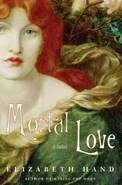
| Publisher: | Harper Perennial |
| Copyright: | 2004 |
| Printing: | 2005 |
| ISBN: | 0-06-075534-2 |
| Format: | Trade paperback |
| Pages: | 364 |
In the late 1800s, Thomas Learmont is trying to find and recapture a woman of surpassing beauty he met as a youth, a woman who is wrapped up in art and paintings and the madness of creationand becomes involved with the pre-Raphaelite painters. Radborne Comstock is a painter in London who is starting to mix with the same crowd, who spots a woman on a bridge through a crowd and can't get her out of his mind.
In present time, Valentine Comstock is growing up in Maine, not knowing his true parents, surrounded by the art of his grandfather's late period where it became increasingly inward and strange. He begins drawing strange art himself, erotic art about a woman who is the entire world, until he's diagnosed with a mania and depression and put on medication that removes his desire to draw. Meanwhile, Daniel Rowlands, a reporter, has taken a leave of absence and is in London, trying to research a book on love. He meets and becomes obsessed with a woman named Larkin who is somehow mixed up in the creative past of a friend and former musician.
This is the cast and setup for Hand's exploration of artistic obsession, the perils of mingling between the mortal and the immortal, and the way the passage of a creature not from our world distorts, twists, and changes human lives. It's told by intermingling bizarre and often horrific scenes from an insane asylum in the 1800s with Daniel's obsession and eventual understanding of who Larkin is. It's full of dream-like description, of smells and tastes and moments where characters fall out of the world into a completely different sensory experience. There is an intellectual puzzle of identification at the root of the story, but Hand spends more effort on the emotional tone, on human reactions to something, someone, too strong for human sanity.
Mortal Love is frequently as much a horror novel as a fantasy. Not horror in the sense of blood-spattered monsters or vampires, but the horror of slow loss of control and growing insanity, of characters whose sense of reality is being broken down and reshaped around a tall, striking woman who is obsessively attractive, strangely knowledgeable about art, and oddly different in her reactions. It's hard to pull this off and still have an intelligible story, and at places the imagery does overwhelm and leave the reader wondering what happened, why, and how it matters. This is particularly a problem at the start, but stick with the book; Hand brings things together in a coherent and well-explained ending. Throughout the book, Daniel's and Valentine's sections are a consistent lifeline of rational plot structure; most of the horror and strangeness are left to the Victorian world of obsessive painters, bizarre pigments, nearly-abandoned mental asylums, and horribly disfigured servants.
Horror is usually not a genre that interests me, but Hand's subject matter is intriguing. Rather than presenting a more typical predatory figure, she creates an outsider in our world who simply doesn't understand it and who causes damage through her fascination, desire, and fundamental incomprehension of mortals and their changes. At the start, I thought Hand would be drawing on classic mythology, but instead she turns more to the symbolism of fairy, the glory and danger of creatures who live parallel to humanity and whose attention humanity cannot easily withstand. I left the book with a feeling of a shadow passing overhead. It's one of the best portrayals of the dark power of fairy that I've seen largely because Hand doesn't describe the power directly but instead details the wake it leaves behind.
This isn't the book to read for a straightforward and obvious story. It's driven by emotion and description rather than plot or intellectual puzzle and is most effective if one is willing to savor dream-like description and try to understand difficult-to-describe emotional impact on the characters. I admit to not much liking the 1800s sections of the book; Daniel's and Valentine's story was much more captivating and Larkin is a memorable character (more so than her earlier counterpart). There were sections I had to wade through (I particularly didn't care for Swinburne), but the overall structure worked for me and the ending is excellent.
Reviewed: 2006-10-31